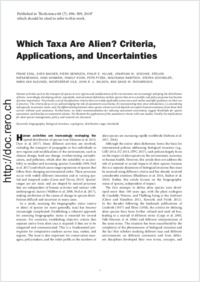Which taxa are alien? Criteria, applications, and uncertainties
- Essl, Franz Division of Conservation Biology, Vegetation and Landscape Ecology, University of Vienna, Austria - Department of Biodiversity and Nature Conservation, Environment Agency Austria, Vienna, Austria - Centre for Invasion, Biology in the Department of Botany and Zoology, Stellenbosch University, South Africa
- Bacher, Sven Department of Biology, University of Fribourg, Switzerland
- Genovesi, Piero Institute for Environmental Protection and Research (ISPRA), International Union for Conservation of Nature Species Survival Commission, Invasive Species Specialist Group, Rome, Italy
- Hulme, Philip E. Bio-Protection Research Centre, Lincoln University, Christchurch, New Zealand
- Jeschke, Jonathan M. Leibniz-Institute of Freshwater Ecology and Inland Fisheries (IGB), Freie Universität Berlin, Germany - Berlin-Brandenburg Institute of Advanced Biodiversity Research (BBIB), Berlin, Germany
- Katsanevakis, Stelios Department of Marine Sciences, University of the Aegean, Mytilene, Greece
- Kowarik, Ingo Berlin-Brandenburg Institute of Advanced Biodiversity Research (BBIB), Universität Berlin, Germany
- Kühn, Ingolf Helmholtz Centre for Environmental Research, Department of Community Ecology, Halle, Germany - Geobotany and Botanical Garden, Martin Luther University Halle-Wittenberg, Halle, Germany - German Centre for Integrative Biodiversity Research, Leipzig, Germany
- Pyšek, Petr Institute of Botany, Czech Academy of Sciences, Pruhonice, Czech Republic - Department of Ecology, Charles University, Prague, Czech Republic
- Rabitsch, Wolfgang Department of Biodiversity and Nature Conservation, Environment Agency Austria, Vienna
- Schindler, Stefan Department of Biodiversity and Nature Conservation, Environment Agency Austria, Vienna
- Kleunen, Mark van Department of Biology, University of Konstanz, Germany - Zhejiang Provincial Key Laboratory of Plant Evolutionary Ecology and Conservation, Taizhou University, China
- Vilà, Montserrat Estación Biológica de Doñana, Consejo Superior de Investigaciones Científicas (EBD-CSIC), Sevilla, Spain
- Wilson, John R. U. Centre for Invasion Biology in the Department of Botany and Zoology, Stellenbosch University, South Africa - South African National Biodiversity Institute, Kirstenbosch Research Centre, Cape Town, South Africa
- Richardson, David M. Centre for Invasion Biology in the Department of Botany and Zoology, Stellenbosch University, South Africa - South African National Biodiversity Institute, Kirstenbosch Research Centre, Cape Town, South Africa
-
01.07.2018
Published in:
- BioScience. - 2018, vol. 68, no. 7, p. 496–509
English
Human activities such as the transport of species to new regions and modifications of the environment are increasingly reshaping the distribution of biota. Accordingly, developing robust, repeatable, and consistent definitions of alien species that serve scientific and policy purposes has become of prime importance. We provide a set of classification criteria that are widely applicable across taxa and realms and offer guidance on their use in practice. The criteria focus on (a) acknowledging the role of assessment uncertainty, (b) incorporating time since introduction, (c) considering infraspecific taxonomic ranks, and (d) differentiating between alien species whose survival depends on explicit human assistance from those that survive without such assistance. Furthermore, we make recommendations for reducing assessment uncertainty, suggest thresholds for species assessment, and develop an assessment scheme. We illustrate the application of the assessment criteria with case studies. Finally, the implications for alien species management, policy, and research are discussed.
- Faculty
- Faculté des sciences et de médecine
- Department
- Département de Biologie
- Language
-
- English
- Classification
- Biological sciences
- License
-
License undefined
- Identifiers
-
- RERO DOC 322802
- DOI 10.1093/biosci/biy057
- DOI 10.1093/biosci/biy057
- Persistent URL
- https://folia.unifr.ch/unifr/documents/307341
Statistics
Document views: 234
File downloads:
- pdf: 290
